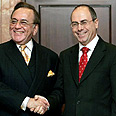
Historic meeting in Turkey
צילום: איי פי
Message to Muslim world
Meeting between Israeli, Pakistani foreign ministers largely symbolic
The significance of the meeting between Foreign Minister Silvan Shalom and his Pakistani counterpart is mostly symbolic, but the importance of symbolism should not be underestimated.
Pakistan, the world's second-largest Muslim country, whose identity is premised on Islam, has shown hostility to Zionism and Israel since its establishment. There is no doubt the meeting constitutes a significant message to other Muslim countries and large Muslim publics by giving legitimacy and a "kosher certificate" to Israel from a leading Islamic country.
At the same time, we can assume that Pakistan's motives for the meeting have more to do with its relations with the United States and General Pervez Musharraf regime's desire for continued American support.
In the wake of the September 11 attacks, Pakistan did an about-face, stopped assisting the extremist Taliban regime in Afghanistan, and joined the American effort against radical Islam. This shift was objected to by radical Islamic elements whose influence on the Pakistani public increased in recent years, leading to greater hostility to Israel and the U.S.
The past Pakistani assistance to Osama Bin Laden greatly embarrassed Musharraf in his relations with the Americans. Bin Laden's probable presence in a Pakistani hiding place, with the assistance of extremist Islamic groups, adds to the embarrassment and is perceived as a threat by the regime.
The fact two of the four terrorists who attacked London about two months ago became radical Muslims after a stay in Pakistan, their former homeland, again embarrassed Musharraf and pushed him to declare he would ban foreign students from joining radical religious schools in his country.
Musharraf is helping Bush
Viewed this way, the meeting between Pakistan's foreign minister and Shalom constitutes a Musharraf message to the U.S. indicating he backs and assists America's Mideast policy, which was harshly criticized in the Arab and Muslim world.
By doing so, Musharraf is helping Bush, who needs signs that his regional policy is succeeding, thus increasing Pakistan's chances to receive something in exchange from the Americans.
The meeting also constitutes a message to Israel that moderate Muslim regimes are willing to take favorable steps and even agree to some kind of normalization in relations with the Jewish state should it continue the diplomatic process with the Palestinians.
On another front, the meeting would not necessarily undermine Israel's ties with India, where the military-strategic component plays a key role. This is the case because in the past two years we have witnessed great improvement in Indian-Pakistani relations.
Both countries undertook significant efforts to reduce tensions over nuclear weapons and Kashmir.
We must also remember that despite the meeting's symbolic importance, it is unlikely Israel and Pakistan will turn into close friends and allies in the near future. Therefore, the meeting would not take away from the importance of the strategic ties between Israel and India.
In conclusion, even if the meeting between the foreign ministers is not a harbinger of strategic change, it is no doubt a useful one, and should be welcomed










